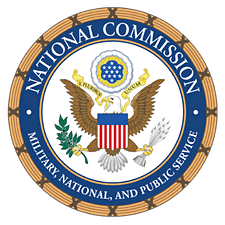 The National Commission on Military, National, and Public Service is a bipartisan, 11-member Commission created by Congress to review the military selective service process and develop recommendations to inspire more Americans — specifically young people — to participate in the military, national, and public service. The Commission was established on September 19, 2017, and launched in January 2018.
The National Commission on Military, National, and Public Service is a bipartisan, 11-member Commission created by Congress to review the military selective service process and develop recommendations to inspire more Americans — specifically young people — to participate in the military, national, and public service. The Commission was established on September 19, 2017, and launched in January 2018.
The Commission quickly determined that improving the quantity and quality of civic education was fundamental to its mission and goals. Several members of the CivxNow Coalition testified before the Commission and provided the Commissioners with a roadmap to improving civic education for every K-12 student in the nation.
On March 25 of this year, the Commission released its final report Inspired to Serve. The report makes substantial recommendations to policymakers at the federal, state, and local levels on how to strengthen and improve civic education. A bill, HR 6415, Inspire to Serve Act of 2020, has been introduced in the U.S. House of Representatives to fulfill the Commission’s federal recommendations. This legislation would appropriate $200 million annually for civic learning and an additional $250 million annually for service learning.
The Commission’s recommendations for state and local policymakers are:
“The Commission encourages State educational agencies (SEAs) and local educational agencies (LEAs) to deliver high-quality civic education to all students by adopting and implementing the following practices for elementary school (grades K–5) instruction and assessment:
- Expose students to civic education, including the basics of government, history, law, and democracy.
- Provide and encourage guided use of civics-related materials in elementary school.
- Incorporate interactive, hands-on learning opportunities, including having students participate in plays about American history and take civics-oriented field trips.
The Commission encourages SEAs and LEAs to deliver high-quality civic education to all students by adopting and implementing the following practices for middle school (grades 6–8) instruction and assessment:
- Provide students with at least one semester of course work devoted to civic education, which incorporates age-appropriate, nonpartisan discussion of current events.
- Integrate civic education into non–social studies coursework, including math and science.
- Engage students in at least one interactive, student-led applied-civics project before they graduate from eighth grade.
- Encourage and facilitate extracurricular programs focused on civic responsibility and community service.
- Encourage students to participate in civics-oriented activities, such as student government, civics-based competitions (for example, quiz bowl, geography bowl, model UN, mock trial, history day, or essay contests on civic or political themes), and nationwide civics programs.
The Commission encourages SEAs and LEAs to deliver high-quality civic education to all students by adopting and implementing the following practices for high school (grades 9–12) instruction and assessment:
- Provide students with a full year of civic education as a condition of graduation and consider ways to integrate civic education into non–social studies coursework, including math and science.”
At the federal level:
“The Commission recommends that Congress create a Civic Education Fund and provide an initial investment of $200 million each year to State educational agencies (SEAs), local educational agencies (LEAs), institutions of higher education (IHEs), and nonprofit organizations, via the U.S. Department of Education, to develop and implement best practice curricula that incorporate civic education, applied civics, and service learning across the K–12 experience and to provide teacher development opportunities in civic education, applied civics, and service learning. The goals, by 2031, are all K–12 students exposed to civic education and all students in 4th, 8th, and 12th grades test at or above ‘Proficient’ in the National Assessment of Educational Progress (NAEP) test in civics.
The Commission recommends that Congress amend the law to require States to participate in the NAEP civics assessment, require the National Center for Education Statistics (NCES) to publish results of the NAEP civics assessment both in the aggregate for the Nation and separately for each State, and require schools to administer the NAEP civics assessment every two years.”
Thank you to Commissioner James and the staff of the National Commission on Military, National, and Public Service Annie Rorem and Paul Lekas, President of Linchpin Strategies Catriona Macdonald, Andrew Wilkes of Generation Citizen, and CivxNow Senior Policy Advisor Ted McConnell for joining us last month to talk about this and other federal policy initiatives during the What Federal Policy and the Stimulus Could Mean for You webinar. You can listen to the webinar recording or check out the slide deck to learn how Coalition members can support national policy efforts and access federal civic education funding.


 See All
See All